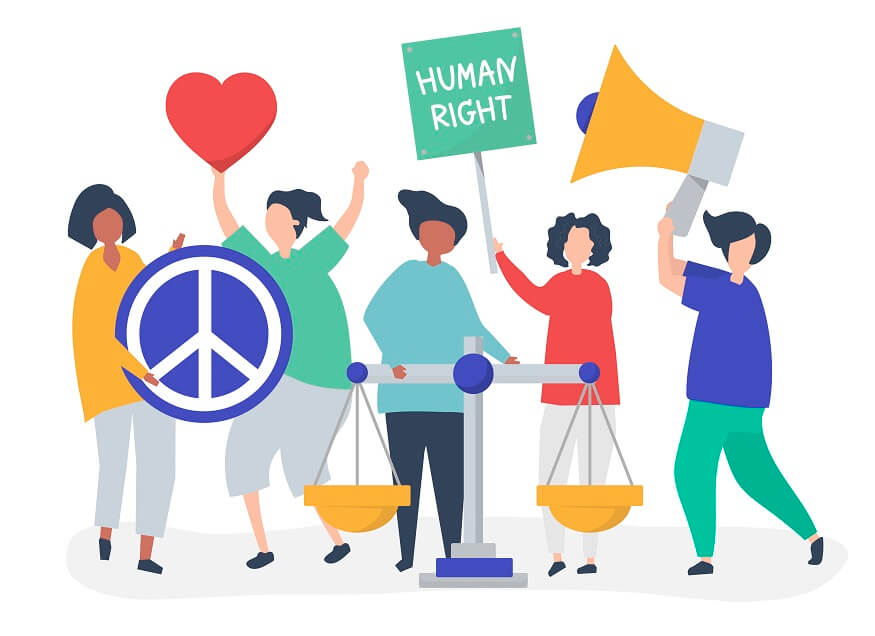The Civil Rights Act of 1964 was enacted by the United States of America on July 1, 1964, to curb any form of discrimination based on race, colour, religion, sex, or national origin. This act formed the culmination of years of the civil rights movement wherein activists fought against atrocities and discrimination against black Americans. This act is believed to be one of the most significant moments of social change in the history of the United States of America.
Also Read: Top 10 Archaeological sites around India
The Civil Rights Movement
Slavery ended in the USA in 1865, but discrimination and oppression of black Americans continued till the late 19th century. The Civil Rights Movement gathered pace during the 1950s and the 1960s when multiple civil rights movements thronged the length and breadth of the United States of America. Martin Luther King Jr. was one of the popular voices of this human rights movement in the 60s. Black Americans faced sustained discrimination and segregation while using public places such as restaurants, bars, schools, jobs, and even buses. Even their voting rights were curbed. Incidents of violence and vandalism against black Americans were far too frequent. Incidents such as the Rosa Parks incident shook the global conscience and the US government finally had to yield and the Civil Rights Act saw the light of the day in 1964.
Also Read: Indian History Chronology: Ancient India to Modern India
The key provisions of the Civil Rights Act of 1964, enacted by the United States of America, are as follows:
- Voting Rights. The Voting Rights Clause ensured the elimination of the selective application of the voter registration clause. However, the requirements around literacy tests remained which in a way disadvantaged black Americans due to their overall low literacy rates. The act did not grant US citizenship as an automatic right to vote. There were certain ‘qualification’ criteria still left open which left enough room for discrimination against black Americans.
- Public Accommodations. This clause outlawed any discrimination based on race, colour, religion, or national origin in public spaces such as hotels, motels, restaurants, theatres, and all other establishments that exist to “serve the public”. This clause however left out from its ambit the “private” establishments which were not open to the public.
- Public Facilities. This clause prohibited state or municipal administration from discriminating or denying services based on race, colour, religion, or national origin.
- Public Education. This clause enforced desegregation in public schools. No public school can deny or segregate students based on race, colour, religion, or national origin.
- Federal Programs. This clause was meant to eliminate discrimination based on race, colour, religion, or national origin in any activity or program that receives federal funding. If found in violation, the said program or activity stood a chance of losing its federal grants.
- Equal Employment. This clause prohibited discrimination based on race, colour, religion, sex, or national origin in any employment opportunities. The employment clause applied to any establishment that had 15 or more employees on a typical working day in 20 or more weeks in the current or preceding year. It also prohibited any discrimination against an individual based on their association with another individual from a particular race, colour, religion, sex, or national origin.
- Voting Statistics. This clause made it essential to collect data relating to voter registration and voter statistics in regions prescribed by the act.
- Civil rights cases. This clause made it easier for the transfer of cases from US state courts to the federal courts. This came as a big relief to civil rights activists who feared they would not get justice in the inherently biassed state courts.
- Community Relations Service. This clause established the Community Relations Service tasked to assist in social disputes involving any form of discrimination based on race, colour, religion, sex, or national origin, or violation of any of the clauses as prescribed in the act.
- For Defendants of Violation. This clause could be argued to create a breathing space for defendants of violation of the above clauses. This clause gave defendants a right to jury trial, and if convicted, limited the fine to not more than $ 1000 and jail time of not more than six months.
Also Read: Top 10 Archaeological sites around India
Many of these clauses were criticised by civil rights activists for leaving space for continued discrimination or violators to get away with discrimination. These clauses saw various amendments over the years emerging out of subsequent cases or lobbying. Things have been reported to have considerably improved for black Americans in the USA.
We even saw the first black president of the United States of America Barack Obama. However, social discrimination in an unwritten rules format is still widely believed to be prevalent in the widespread American society. Black Americans remain largely in poverty as compared to white Americans. With movements such as #BlackLivesMatter seeing the light of the day as recently as 2022, it is widely believed that black Americans continue to be socially discriminated against and oppressed in America.










